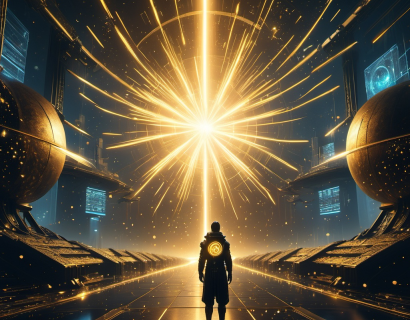Decentralized Innovation: Leveraging Crypto and AI for Next-Gen Digital Transformation
The digital landscape is undergoing a profound transformation, driven by the convergence of two revolutionary technologies: cryptocurrency and artificial intelligence (AI). This synergy is not just a technological curiosity but a powerful force reshaping how we interact with digital services, manage data, and experience the internet. This article explores the transformative potential of merging crypto and AI, delving into how these technologies are creating decentralized solutions that promise to enhance user experiences, increase security, and foster innovation.
Understanding Decentralization
Decentralization is at the core of this transformation. Traditional centralized systems rely on a central authority or server to manage and control data and transactions. This model, while efficient in some respects, has significant drawbacks, including single points of failure, censorship, and privacy concerns. Decentralized systems, on the other hand, distribute control across a network of nodes, eliminating the need for a central authority. This distribution enhances security, reduces the risk of outages, and empowers users by giving them more control over their data and transactions.
Cryptocurrency: The Backbone of Decentralization
Cryptocurrency, particularly blockchain technology, is the foundational element of decentralized systems. Blockchain isa distributed ledger that records transactions across multiple computers in such a way that the registered transactions cannot be altered retroactively. This immutability and transparency are crucial for building trust in decentralized applications (dApps). Cryptocurrencies like Bitcoin and Ethereum have demonstrated the potential of decentralized finance (DeFi), offering alternatives to traditional financial systems. These cryptocurrencies enable peer-to-peer transactions without intermediaries, reducing costs and increasing accessibility.
AI: Enhancing Decentralized Systems
Artificial intelligence complements decentralization by bringing intelligence and automation to dApps. AI algorithms can process vast amounts of data, identify patterns, and make predictions, all of which are invaluable in a decentralized environment. For instance, AI can enhance the efficiency of decentralized networks by optimizing resource allocation, improving security through anomaly detection, and personalizing user experiences. The integration of AI with blockchain technology opens up new possibilities for smart contracts, predictive analytics, and autonomous systems.
Smart Contracts: Automating Trust
One of the most significant applications of the crypto-AI convergence is the development of smart contracts. Smart contracts are self-executing contracts with the terms of the agreement directly written into code. They run on blockchain networks, ensuring transparency andreducing the need for intermediaries. AI can further enhance smart contracts by providing predictive capabilities and adaptive logic. For example, AI can analyze market conditions and automatically adjust contract terms to optimize outcomes, making decentralized applications more dynamic and responsive.
Decentralized Identity Management
Privacy and identity management are critical concerns in the digital age. Decentralized identity solutions leverage blockchain to give users control over their personal data. AI can enhance these solutions by providing advanced authentication methods, such as biometric verification, and by detecting and preventing fraudulent activities. A decentralized identity system ensures that users can verify their identity without relying on centralized authorities, thereby enhancing privacy and security.
Decentralized Data Markets
Data is the new oil, and decentralized data markets are emerging to capitalize on this valuable resource. In a decentralized data market, users can monetize their data by selling access to it to organizations that need it, all while maintaining control and privacy. AI plays a crucial role in these markets by matching data suppliers with buyers based on relevance and demand. This not only creates new revenue streams for individuals but also ensures that data is used ethically and transparently.
Decentralized Governance
Decentralized governance models are redefining how communities and organizations make decisions. Blockchain-based governance platforms allow stakeholders to propose, vote on, and implement changes in a transparent and tamper-proof manner. AI can augment this process by analyzing voting patterns, predicting outcomes, and suggesting improvements to the governance structure. This combination ensures that decisions are made in the best interest of the community, fostering trust and participation.
Challenges and Considerations
While the potential of decentralized innovation is immense, there are several challenges that need to be addressed. Scalability remains a significant issue for blockchain networks, as they struggle to handle high transaction volumes efficiently. AI algorithms require substantial computational resources, which can be costly and energy-intensive. Additionally, regulatory frameworks are still evolving, and there is a need for clear guidelines to ensure the responsible use of these technologies. Addressing these challenges is crucial for the widespread adoption and success of decentralized solutions.
Future Prospects
The future of decentralized innovation is bright, with numerous exciting developments on the horizon. The integration of 5G and IoT technologies will further enhance the capabilities of decentralized networks, enabling real-time data processing and more sophisticated AI applications. The rise of decentralized autonomous organizations (DAOs) is another area worth watching, as they have thepotential to revolutionize how businesses and communities operate. As these technologies mature, we can expect to see more seamless and intuitive decentralized applications that blend the best of crypto and AI to create a more equitable and efficient digital world.
Conclusion
The convergence of cryptocurrency and artificial intelligence is not just a technological trend but a fundamental shift in how we build and interact with digital systems. By leveraging the strengths of both decentralization and AI, we can create more secure, transparent, and user-centric solutions. As we continue to explore and innovate in this space, the possibilities are endless, promising a future where technology serves humanity in the most empowering and beneficial ways.



